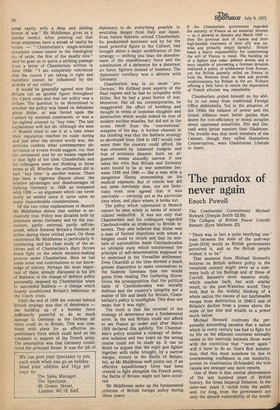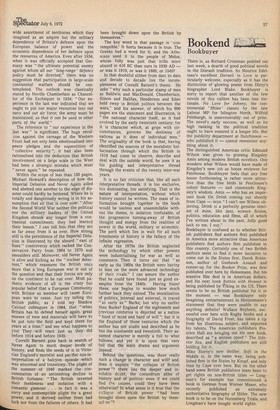The paradox of never again
Enoch Powell
The Continental Commitment Michael Howard (Temple Smith £2.50) The Collapse of British Power Correlli Barnett (Eyre Methuen e5) " There was in fact a quite terrifying con-trast between the state of the post-war [post-1918] world as British governments perceived it, and as the British people wished it to be."
That sentence from Michael Howard's lectures on British defence policy in the twentieth century might serve as a summary both of his findings and of those of Correlli Barnett's more massive study, which reaches back, but with similar result, to the post-Waterloo world. They both find in the wishful thinking of a whole nation the causes of out hairbreadth escape from destruction in 1940-2 and of Britain's decline from a power above the scale of her size and wealth to a power much below.
Michael Howard confronts the perpetually astounding paradox that a nation which in every century has had to fight for its life on the adjacent continent normally exists in the intervals between those wars with the conviction that "never again" will it have to do so. One's first assumption, that this must somehow be due to overweening confidence in our insularity, proves on examination ill-founded; the true causes are stranger and more remote.
One of them is that central phenomenon of the last hundred years of British history, the Great Imperial Delusion. In the inter-war years it veiled from the public and, for long, from the government not only the absurd vulnerability of the world wide assortment of territories which they imagined as an empire but the military dependence of Britain's defence upon the European balance of power and the economic dependence of her defence upon the resources of America. Even after 1934, when it was officially accepted that Germany was "the ultimate potential enemy against whom all our ' long-range ' defence policy must be directed," there was no suggestion that participation in large-scale continental warfare should be contemplated. The outlook was classically stated by Neville Chamberlain as Chancellor of the Exchequer in 1934: "Our experience in the last war indicated that we ought to put our major resources into our navy and our air force; the army must be maintained, so that it can be used in other parts of the world."
The reference to " our experience in the last war" is significant. The huge revulsion against the carnage of the Western Front had not only been emotionalised into peace pledges and the superstition of "collective security "; it had also been rationalised into the deduction that British involvement on a large scale in the West had been a strategic mistake which must "never again" be repeated.
Within the scope of less than 150 pages, Michael Howard's description of how the Imperial Delusion and Never Again aided and abetted one another to the edge of disaster could hardly be bettered. Where he is totally and dangerously wrong is in his assumption that all that is over now: "After the Second World War neither the political nor the military leaders of the United Kingdom shrank any longer from a continental commitment; they had learned their lesson." I can tell him that they are as far away from it as ever. How strong still is the persistence of the Imperial Delusion is illustrated, by the absurd " east of Suez" controversy which racked the Conservative Party from 1964 to 1970 and smoulders still. Moreover, old Never Again is alive and kicking as the "nuclear deterrent," which reassures the British once more that a long European war is out of the question and that their forces are only on the continent to be run over. Most pathetic evidence of all is the crazy but popular belief that a European Community with Britain as member will cause European wars to cease. Just try telling the British public, as I told my Shadow Cabinet colleagues in 1964, that "when Britain has to defend herself again, great masses of men and materials will have to be put into the field and kept there for years at a time," and see what happens to you! They will react just as they did before 1914 and before 1939.
Correlli Barnett goes back in search of Never Again to much deeper levels of history, and finds the seeds of it in Victorian England's moralist and pacifist mis-interpretation of a halcyon episode which was abnormal and transitory. The plight of the summer of 1940 marked the consummation of an astonishing decline in British fortunes: "The British invested their feebleness and isolation with a romantic glamour . . . in fact it was a sorry and contemptible plight for a great Power, and it derived neither from bad luck nor from the failures of others. It had been brought down upon the British by themselves."
The key word in that passage is 'con temptible.' It hurts because it is true. The Greeks had a word for it; and the Athe nians used it to the people of Melos, whose folly was just that trifle more absurd in 416 BC than ours in 1939 AD — or was it 1919, or was it 1899, or 1849?
In that doubtful slither from date to date and decade to decade lies the incom pleteness of Correlli Barnett's thesis. He asks "why such a particular stamp of men as Baldwin and MacDonald, Chamberlain, Simon and Halifax, Henderson and Eden held sway in British politics between the wars," and his answer, of which his 600 pages are the statement and illustration, is "the national character itself, as it had evolved by the early twentieth century; for it is character which, at grips with cir cumstances, governs the destinies of nations as it does of individual men."
The originality of the book is that, having identified the sources of the moralistic hallucination through which the British in 1919 had come to observe, describe and deal with the outside world, he uses it as his guiding and interpretative thread through the events of the twenty inter-war years.
It is no fair criticism that, like all such interpretative threads, it is too exclusive, tco dominating, too satisfying. That is the nature of interpretation, without which history cannot be written. The mass of in formation brought together in the book would be useless and unassimilable without the theme, in isolation irrefutable, of the progressive turning-away of British thought and energy from the realities of power in the world, military or economic.
The peril which lies in wait for all such treatments of history is the fallacy of the infinite regression.
After the 1870s the British neglected the technology by which other powers were industrialising for war as well as commerce. Then it turns out that "as early as the 1860s the British were having to lean on the more advanced technology of their rivals." I can assure the author that he could have found just as good ex amples from the 1840s. Having found these, one begins to wonder how much further back they extend. The moralisation of politics, internal and external, is traced "as early as" Burke; but why no earlier than Burke? England of the eighteenth and previous centuries is depicted as a nation "hard of mind and, hard of will "; but it is the England of those centuries which the author has not studie and described as he has the nineteenth and twentieth. Their assumed character is merely a foil to what follows; and yet it is upon that very foil that the main drama and argument depend.
Behind the questions, was there really such a change in character and will? and, does it explain "the collapse of British power "? there lies the deeper and insoluble dcubt, the conundrum alike of history and of politics: even if we could find the causes, could they have been otherwise? In what sense is it true that the
colaine of British power "had been brought down upon the British by themsch.es "?











































 Previous page
Previous page